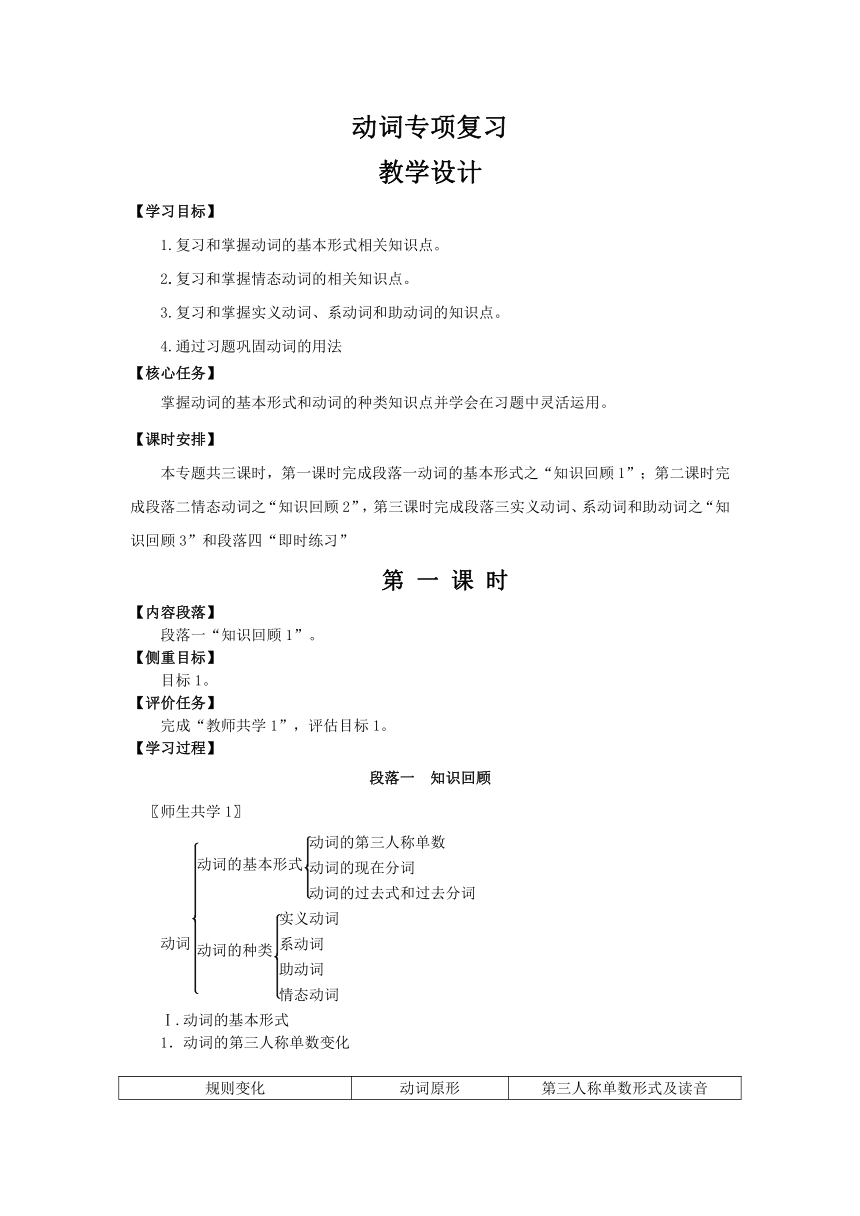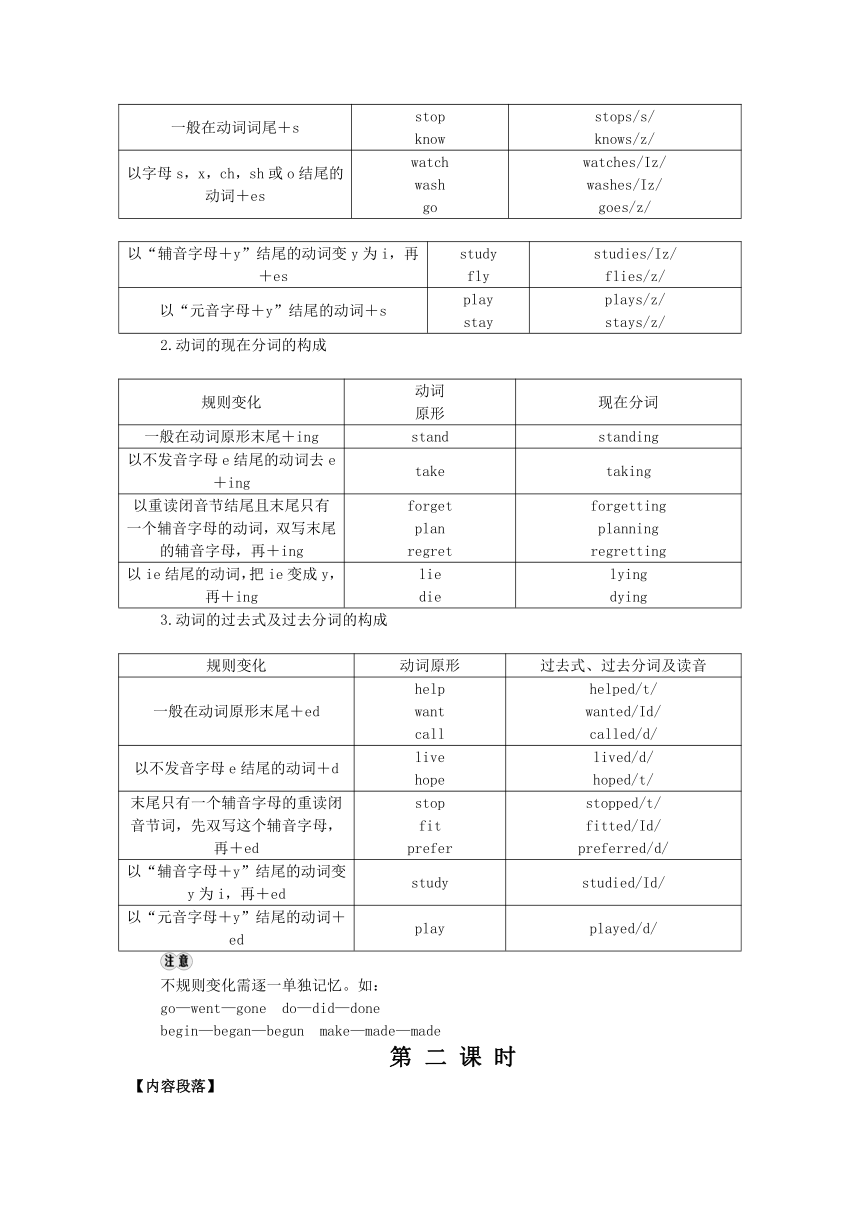2024年人教版英语九年级中考动词专项复习教案
文档属性
| 名称 | 2024年人教版英语九年级中考动词专项复习教案 |  | |
| 格式 | docx | ||
| 文件大小 | 346.2KB | ||
| 资源类型 | 教案 | ||
| 版本资源 | 人教新目标(Go for it)版 | ||
| 科目 | 英语 | ||
| 更新时间 | 2024-02-23 13:04:43 | ||
图片预览



文档简介
动词专项复习
教学设计
【学习目标】
1.复习和掌握动词的基本形式相关知识点。
2.复习和掌握情态动词的相关知识点。
3.复习和掌握实义动词、系动词和助动词的知识点。
4.通过习题巩固动词的用法
【核心任务】
掌握动词的基本形式和动词的种类知识点并学会在习题中灵活运用。
【课时安排】
本专题共三课时,第一课时完成段落一动词的基本形式之“知识回顾1”;第二课时完成段落二情态动词之“知识回顾2”,第三课时完成段落三实义动词、系动词和助动词之“知识回顾3”和段落四“即时练习”
第 一 课 时
【内容段落】
段落一“知识回顾1”。
【侧重目标】
目标1。
【评价任务】
完成“教师共学1”,评估目标1。
【学习过程】
段落一 知识回顾
〖师生共学1〗
动词
Ⅰ.动词的基本形式
1.动词的第三人称单数变化
规则变化 动词原形 第三人称单数形式及读音
一般在动词词尾+s stop know stops/s/ knows/z/
以字母s,x,ch,sh或o结尾的动词+es watch wash go watches/Iz/ washes/Iz/ goes/z/
以“辅音字母+y”结尾的动词变y为i,再+es study fly studies/Iz/ flies/z/
以“元音字母+y”结尾的动词+s play stay plays/z/ stays/z/
2.动词的现在分词的构成
规则变化 动词 原形 现在分词
一般在动词原形末尾+ing stand standing
以不发音字母e结尾的动词去e+ing take taking
以重读闭音节结尾且末尾只有一个辅音字母的动词,双写末尾的辅音字母,再+ing forget plan regret forgetting planning regretting
以ie结尾的动词,把ie变成y,再+ing lie die lying dying
3.动词的过去式及过去分词的构成
规则变化 动词原形 过去式、过去分词及读音
一般在动词原形末尾+ed help want call helped/t/ wanted/Id/ called/d/
以不发音字母e结尾的动词+d live hope lived/d/ hoped/t/
末尾只有一个辅音字母的重读闭音节词,先双写这个辅音字母,再+ed stop fit prefer stopped/t/ fitted/Id/ preferred/d/
以“辅音字母+y”结尾的动词变y为i,再+ed study studied/Id/
以“元音字母+y”结尾的动词+ed play played/d/
不规则变化需逐一单独记忆。如:
go—went—gone do—did—done
begin—began—begun make—made—made
第 二 课 时
【内容段落】
段落二“知识回顾”。
【侧重目标】
目标2。
【评价任务】
完成“教师共学2”,评估目标2。
【学习过程】
段落二 知识回顾
〖教师共学2〗
情态动词
情态动词表示说话人对某一动作或状态的态度,具有一定的感彩。
情态动词具有以下特点:(1)有一定词义;(2)不受主语人称和数的变化影响;(3)后跟动词原形一起构成谓语,不能单独充当谓语。
(1)can,could的用法
①Can you (=Will you be able to) come this evening
你今晚能来吗?
解读can表示具有某种能力, 意为“能;会”, 与be able to的意义基本相同。但can只能用于一般现在时和一般过去时, 而be able to却能用于各种时态。
②Can he still be alive after all this time
过了这么长时间,他还可能活着吗?
解读表示可能性, 意为“可能”。
③You can/may keep this book for two weeks.
这本书你可以借两周。
解读can表示许可, 意为“可以”。在口语中常代替may。
④Could you come earlier next time
您下次早点儿来,行吗?
解读can的过去式是could。在口语中, could常代替can来向对方委婉地提出请求或表示看法, 是一种有礼貌的说法。这时could不表示过去时态。
(2)may,might 的用法
①—May I borrow your bike
我可以借你的自行车吗?
—Yes, you may./ No, you mustn't/can't.
是的,你可以。/不,你不可以。
解读用来征求对方意见, 意为“允许;可以”。此时, 因为口语性比较强, 因此答语较灵活, 但要根据实际情况作答。
②If you are not careful, a car may hit you.
如果你不小心,汽车可能会撞着你。
解读表示说话人的猜测和对可能性的判断, 意为“可能;也许”。
③May you succeed!祝你成功!
解读用在祈使句中表示祝愿。
④Might I use your pen for a while
我可以用一会儿你的钢笔吗?
解读may的过去式might表示的语气更加委婉。
(3)must 的用法
①—Must I finish the work today, Mom
妈妈,我今天必须完成工作吗?
—No, you needn't.You can finish it tomorrow.
不必,你可以明天完成它。
解读表示说话人的主观意志, 意为“必须;应当”, 表示说话人主观认为“应该;必须”, 它无人称、数和时态的变化。其否定式答语通常用needn't或don't have to, 意为“不必”。
It's raining hard.We have__to stop.
雨下得真大,我们不得不停下来。
You must do as I told you.你必须按我说的做。
解读have to 意为“不得不;必须”,主要强调的是外界客观因素,如环境、习惯、急事等要求某人“不得不;只好”。它可用于多种时态(一般不用于进行时态),且有人称和数的变化。must意为“必须”,强调说话人的主观看法。
②You mustn't play on the road.你不许在马路上玩。
解读must 的否定形式 must not(mustn't)意为“不许(做某事);一定不要”, 表示禁止和告诫。
③I must have seen him somewhere.
我肯定在某个地方见过他。
He can't be at school.他不可能在学校。
Mom may be at home.But I'm not sure.
妈妈可能在家,但我不确定。
解读表示对事物的推测, 意为“想必;一定”, 只用于肯定句。must 的语气比may 要肯定得多。表示有把握的否定判断时用cannot/can't,__意为“不可能”。
(4)will, would的用法
①Fish will die without water.没有水鱼就会死去。
解读will表示必然性。
②We'll help him if he asks us for help.
如果他向我们寻求帮助,我们会帮他。
I promised that I would do my best.
我答应你,我会尽全力。
解读will/would表示意愿。
③Would you like another glass of beer
再来杯啤酒好吗?
解读表委婉地提出请求、建议或者看法, 常用would与like, love连用。
④Every time she was in trouble, she would go to him for help.她每次遇到麻烦都会向他求助。
解读表过去反复发生的动作或过去的一种倾向。
(5)shall,should的用法
①Shall we meet at the school gate tomorrow morning?明天早上我们在学校门口见面好吗?
解读shall作情态动词, 常用于一般疑问句, 与第一人称连用, 表示征求意见或看法。
②We should be strict in all our work.
我们应该严格要求我们所有的工作。
解读should用作情态动词, 表示劝告或建议, 意为“应该”, 表示必要性。此时, 不可看作shall的过去式。
(6)need的用法
—Need I finish the work today
我需要今天完成这项工作吗?
—Yes, you must./ No, you needn't.
是的,你必须完成。/不,你不必。
解读need作情态动词, 意为“需要”, 主要用于一般疑问句和否定句。其肯定回答用must, 否定回答用needn't。
—Does he need to wash his hands?他需要洗手吗?
—Yes, he does./No, he doesn't.是的,他需要。/不,他不需要。
解读need作及物动词时,其后的宾语可以是名词、动词不定式、动名词、代词。用法与其他行为动词一样,有人称和数的变化。
第 三 课 时
【内容段落】
段落三“知识回顾”。
段落四“即时练习”
【侧重目标】
目标3,目标4。
【评价任务】
完成“教师共学3”,评估目标3。
完成“小组合学”,评估目标4。
【学习过程】
段落三 知识回顾
〖教师共学3〗
1.实义动词(行为动词)
(1)He always studies hard.(study后无宾语,为不及物动词)
他一直努力学习。
(2)I bought some books yesterday.(bought后有宾语books,为及物动词)
我昨天买了一些书。
解读实义动词根据后面是否带宾语, 可分为及物动词和不及物动词。及物动词后面要跟宾语, 不及物动词后不跟宾语。
(1)She sings very well.(sing在此作不及物动词)
她唱得很好。
(2)She sang an English song just now.(sing在此作及物动词)
她刚才唱了一首英文歌。
解读有的动词既可作及物动词,也可作不及物动词。
2.系动词
状态系动词用来表示主语状态,只有be (am, is, are, was, were);持续系动词表示主语继续或保持一种状态或态度,主要有keep, remain, stay等;表象系动词有seem, appear等;感官系动词表示人的感觉,主要有feel, smell, sound, taste等;变化系动词表示主语的变化,主要有become, go, grow, turn等。
3.助动词
What do you often do at the weekend
周末你经常做什么?
解读助动词没有词义, 不能单独作谓语, 要和主要动词一起构成谓语。如do/does/did, have/has/had等。
段落四 即时练习
〖小组合学〗
一、选用合适的词语填空。
1.—What will the weather be like the day after tomorrow
—It __might__ (must, should, can't, might) be rainy, cloudy or sunny.I'm not sure.
2.I didn't mean to trouble Curry yesterday.It was pouring with rain so I __accepted__ (refused, received, allowed, accepted) his offer of a lift.
3.—__Can__ (Can, May, Must) you tell me the differences between these twins
—No.They look quite similar, nearly the same.
4.—__Must__ (Can, Must, Shall, Could) I hand in the project report today
—No, you needn't.
5.—Mom, I'll be in the final singing competition tomorrow.
—Be careful not to get a sore throat and __lose__ (lose, raise, drop, break) your voice.
6.These oranges look nice, but __taste__ (feel, taste, sound, look) very terrible.
7.We should keep quiet in the library.We __mustn't__ (can, must, needn't, mustn't) speak loudly.
8.—I don't care what people think.
—Well, you __should__ (can, may, should, will).You are not alone in this world.
二、单句语法填空。
1.Jim has __made__ (make) up his mind to work hard.
2.Mrs.Smith was doing the dishes while her daughter __was__repairing__ (repair) her bike.
3.Do you know the person who __is__running__ (run) after the train now
4.Alice__introduces__ (introduce) the traditional Chinese clothing into the world when going on a visit abroad every year.
5.—What are you doing
—I am reading a book that __was__written__ (write) by my favorite writer.
6.—Did you do anything interesting last Saturday
—Not really.I just __stayed__ (stay) at home.
7.—How do you usually go to school
—I __go__ (go) to school by bus.
8.The newly opened company __provides__ (provide) the local people with more chances to work.
三、单词拼写。
1.Winning__ the competition made Ben's parents feel glad and proud.
2.I can't tell you what she said__.I've promised to keep it a secret.
3.My grandfather usually reads__ newspapers after dinner.
4.The boss asked Robert to go and find__ out if there was anyone else absent.
5.I've just returned__ from my trip to New York.I visited many interesting places there.
6.She tried to pay__ attention to what he was saying.
7.My grandmother was cooking__ dinner when I got home yesterday.
8.—Who is that woman
—She's Miss Jackson. She teaches__ us music, and she is so good.
【教学反思】
教学设计
【学习目标】
1.复习和掌握动词的基本形式相关知识点。
2.复习和掌握情态动词的相关知识点。
3.复习和掌握实义动词、系动词和助动词的知识点。
4.通过习题巩固动词的用法
【核心任务】
掌握动词的基本形式和动词的种类知识点并学会在习题中灵活运用。
【课时安排】
本专题共三课时,第一课时完成段落一动词的基本形式之“知识回顾1”;第二课时完成段落二情态动词之“知识回顾2”,第三课时完成段落三实义动词、系动词和助动词之“知识回顾3”和段落四“即时练习”
第 一 课 时
【内容段落】
段落一“知识回顾1”。
【侧重目标】
目标1。
【评价任务】
完成“教师共学1”,评估目标1。
【学习过程】
段落一 知识回顾
〖师生共学1〗
动词
Ⅰ.动词的基本形式
1.动词的第三人称单数变化
规则变化 动词原形 第三人称单数形式及读音
一般在动词词尾+s stop know stops/s/ knows/z/
以字母s,x,ch,sh或o结尾的动词+es watch wash go watches/Iz/ washes/Iz/ goes/z/
以“辅音字母+y”结尾的动词变y为i,再+es study fly studies/Iz/ flies/z/
以“元音字母+y”结尾的动词+s play stay plays/z/ stays/z/
2.动词的现在分词的构成
规则变化 动词 原形 现在分词
一般在动词原形末尾+ing stand standing
以不发音字母e结尾的动词去e+ing take taking
以重读闭音节结尾且末尾只有一个辅音字母的动词,双写末尾的辅音字母,再+ing forget plan regret forgetting planning regretting
以ie结尾的动词,把ie变成y,再+ing lie die lying dying
3.动词的过去式及过去分词的构成
规则变化 动词原形 过去式、过去分词及读音
一般在动词原形末尾+ed help want call helped/t/ wanted/Id/ called/d/
以不发音字母e结尾的动词+d live hope lived/d/ hoped/t/
末尾只有一个辅音字母的重读闭音节词,先双写这个辅音字母,再+ed stop fit prefer stopped/t/ fitted/Id/ preferred/d/
以“辅音字母+y”结尾的动词变y为i,再+ed study studied/Id/
以“元音字母+y”结尾的动词+ed play played/d/
不规则变化需逐一单独记忆。如:
go—went—gone do—did—done
begin—began—begun make—made—made
第 二 课 时
【内容段落】
段落二“知识回顾”。
【侧重目标】
目标2。
【评价任务】
完成“教师共学2”,评估目标2。
【学习过程】
段落二 知识回顾
〖教师共学2〗
情态动词
情态动词表示说话人对某一动作或状态的态度,具有一定的感彩。
情态动词具有以下特点:(1)有一定词义;(2)不受主语人称和数的变化影响;(3)后跟动词原形一起构成谓语,不能单独充当谓语。
(1)can,could的用法
①Can you (=Will you be able to) come this evening
你今晚能来吗?
解读can表示具有某种能力, 意为“能;会”, 与be able to的意义基本相同。但can只能用于一般现在时和一般过去时, 而be able to却能用于各种时态。
②Can he still be alive after all this time
过了这么长时间,他还可能活着吗?
解读表示可能性, 意为“可能”。
③You can/may keep this book for two weeks.
这本书你可以借两周。
解读can表示许可, 意为“可以”。在口语中常代替may。
④Could you come earlier next time
您下次早点儿来,行吗?
解读can的过去式是could。在口语中, could常代替can来向对方委婉地提出请求或表示看法, 是一种有礼貌的说法。这时could不表示过去时态。
(2)may,might 的用法
①—May I borrow your bike
我可以借你的自行车吗?
—Yes, you may./ No, you mustn't/can't.
是的,你可以。/不,你不可以。
解读用来征求对方意见, 意为“允许;可以”。此时, 因为口语性比较强, 因此答语较灵活, 但要根据实际情况作答。
②If you are not careful, a car may hit you.
如果你不小心,汽车可能会撞着你。
解读表示说话人的猜测和对可能性的判断, 意为“可能;也许”。
③May you succeed!祝你成功!
解读用在祈使句中表示祝愿。
④Might I use your pen for a while
我可以用一会儿你的钢笔吗?
解读may的过去式might表示的语气更加委婉。
(3)must 的用法
①—Must I finish the work today, Mom
妈妈,我今天必须完成工作吗?
—No, you needn't.You can finish it tomorrow.
不必,你可以明天完成它。
解读表示说话人的主观意志, 意为“必须;应当”, 表示说话人主观认为“应该;必须”, 它无人称、数和时态的变化。其否定式答语通常用needn't或don't have to, 意为“不必”。
It's raining hard.We have__to stop.
雨下得真大,我们不得不停下来。
You must do as I told you.你必须按我说的做。
解读have to 意为“不得不;必须”,主要强调的是外界客观因素,如环境、习惯、急事等要求某人“不得不;只好”。它可用于多种时态(一般不用于进行时态),且有人称和数的变化。must意为“必须”,强调说话人的主观看法。
②You mustn't play on the road.你不许在马路上玩。
解读must 的否定形式 must not(mustn't)意为“不许(做某事);一定不要”, 表示禁止和告诫。
③I must have seen him somewhere.
我肯定在某个地方见过他。
He can't be at school.他不可能在学校。
Mom may be at home.But I'm not sure.
妈妈可能在家,但我不确定。
解读表示对事物的推测, 意为“想必;一定”, 只用于肯定句。must 的语气比may 要肯定得多。表示有把握的否定判断时用cannot/can't,__意为“不可能”。
(4)will, would的用法
①Fish will die without water.没有水鱼就会死去。
解读will表示必然性。
②We'll help him if he asks us for help.
如果他向我们寻求帮助,我们会帮他。
I promised that I would do my best.
我答应你,我会尽全力。
解读will/would表示意愿。
③Would you like another glass of beer
再来杯啤酒好吗?
解读表委婉地提出请求、建议或者看法, 常用would与like, love连用。
④Every time she was in trouble, she would go to him for help.她每次遇到麻烦都会向他求助。
解读表过去反复发生的动作或过去的一种倾向。
(5)shall,should的用法
①Shall we meet at the school gate tomorrow morning?明天早上我们在学校门口见面好吗?
解读shall作情态动词, 常用于一般疑问句, 与第一人称连用, 表示征求意见或看法。
②We should be strict in all our work.
我们应该严格要求我们所有的工作。
解读should用作情态动词, 表示劝告或建议, 意为“应该”, 表示必要性。此时, 不可看作shall的过去式。
(6)need的用法
—Need I finish the work today
我需要今天完成这项工作吗?
—Yes, you must./ No, you needn't.
是的,你必须完成。/不,你不必。
解读need作情态动词, 意为“需要”, 主要用于一般疑问句和否定句。其肯定回答用must, 否定回答用needn't。
—Does he need to wash his hands?他需要洗手吗?
—Yes, he does./No, he doesn't.是的,他需要。/不,他不需要。
解读need作及物动词时,其后的宾语可以是名词、动词不定式、动名词、代词。用法与其他行为动词一样,有人称和数的变化。
第 三 课 时
【内容段落】
段落三“知识回顾”。
段落四“即时练习”
【侧重目标】
目标3,目标4。
【评价任务】
完成“教师共学3”,评估目标3。
完成“小组合学”,评估目标4。
【学习过程】
段落三 知识回顾
〖教师共学3〗
1.实义动词(行为动词)
(1)He always studies hard.(study后无宾语,为不及物动词)
他一直努力学习。
(2)I bought some books yesterday.(bought后有宾语books,为及物动词)
我昨天买了一些书。
解读实义动词根据后面是否带宾语, 可分为及物动词和不及物动词。及物动词后面要跟宾语, 不及物动词后不跟宾语。
(1)She sings very well.(sing在此作不及物动词)
她唱得很好。
(2)She sang an English song just now.(sing在此作及物动词)
她刚才唱了一首英文歌。
解读有的动词既可作及物动词,也可作不及物动词。
2.系动词
状态系动词用来表示主语状态,只有be (am, is, are, was, were);持续系动词表示主语继续或保持一种状态或态度,主要有keep, remain, stay等;表象系动词有seem, appear等;感官系动词表示人的感觉,主要有feel, smell, sound, taste等;变化系动词表示主语的变化,主要有become, go, grow, turn等。
3.助动词
What do you often do at the weekend
周末你经常做什么?
解读助动词没有词义, 不能单独作谓语, 要和主要动词一起构成谓语。如do/does/did, have/has/had等。
段落四 即时练习
〖小组合学〗
一、选用合适的词语填空。
1.—What will the weather be like the day after tomorrow
—It __might__ (must, should, can't, might) be rainy, cloudy or sunny.I'm not sure.
2.I didn't mean to trouble Curry yesterday.It was pouring with rain so I __accepted__ (refused, received, allowed, accepted) his offer of a lift.
3.—__Can__ (Can, May, Must) you tell me the differences between these twins
—No.They look quite similar, nearly the same.
4.—__Must__ (Can, Must, Shall, Could) I hand in the project report today
—No, you needn't.
5.—Mom, I'll be in the final singing competition tomorrow.
—Be careful not to get a sore throat and __lose__ (lose, raise, drop, break) your voice.
6.These oranges look nice, but __taste__ (feel, taste, sound, look) very terrible.
7.We should keep quiet in the library.We __mustn't__ (can, must, needn't, mustn't) speak loudly.
8.—I don't care what people think.
—Well, you __should__ (can, may, should, will).You are not alone in this world.
二、单句语法填空。
1.Jim has __made__ (make) up his mind to work hard.
2.Mrs.Smith was doing the dishes while her daughter __was__repairing__ (repair) her bike.
3.Do you know the person who __is__running__ (run) after the train now
4.Alice__introduces__ (introduce) the traditional Chinese clothing into the world when going on a visit abroad every year.
5.—What are you doing
—I am reading a book that __was__written__ (write) by my favorite writer.
6.—Did you do anything interesting last Saturday
—Not really.I just __stayed__ (stay) at home.
7.—How do you usually go to school
—I __go__ (go) to school by bus.
8.The newly opened company __provides__ (provide) the local people with more chances to work.
三、单词拼写。
1.Winning__ the competition made Ben's parents feel glad and proud.
2.I can't tell you what she said__.I've promised to keep it a secret.
3.My grandfather usually reads__ newspapers after dinner.
4.The boss asked Robert to go and find__ out if there was anyone else absent.
5.I've just returned__ from my trip to New York.I visited many interesting places there.
6.She tried to pay__ attention to what he was saying.
7.My grandmother was cooking__ dinner when I got home yesterday.
8.—Who is that woman
—She's Miss Jackson. She teaches__ us music, and she is so good.
【教学反思】
同课章节目录
